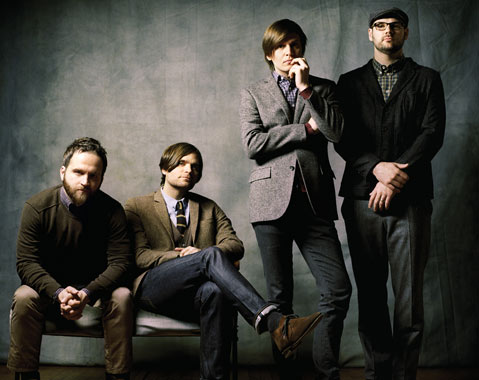It’s All Smiles for Death Cab for Cutie
Indie Rockers Bring New Album to the S.B. Bowl on Saturday, October 15

Since the band’s lo-fi, bedroom-project beginnings back in the late ’90s, Death Cab for Cutie has grown to become one of indie rock’s greatest success stories. Calling them “superstars” might send some purists running for the hills, but with a major-label recording deal, three gold-certified albums, and a handful of Grammy nods under their collective belt, there’s no denying the clout that these four now carry.
Born in Bellingham, Washington, as a solo project for now-frontman Ben Gibbard, Death Cab spent its early years buried beneath the shadow cast by Nirvana and the grunge-rock behemoth. As a four-piece (with guitarist Chris Walla, bassist Nick Harmer, and drummer Jason McGerr), they found a small but fervent following in the early 2000s, gaining acclaim for their heartfelt, personal, and oftentimes somber pop orchestrations and Gibbard’s signature boyish vocals. A sleeper hit (2003’s Transatlanticism) and a few well-placed licensing spots later, and the Death Cab boys were being courted by Atlantic Records and playing sold-out shows in the U.S. and abroad.
Now, some 14 years since Gibbard’s solo start, Death Cab is touting a new studio album (Codes and Keys), a new place of residence (Los Angeles), and a new, upbeat outlook on life (spawned by marriages, fatherhood, and a nice, long break from music making). This Saturday, October 15, the band hits the Santa Barbara Bowl in support of Codes and Keys. I recently spoke with drummer Jason McGerr about the recording process.
You guys took a pretty sizable break between Codes and Keys and your last album, Narrow Stairs. Were you wary getting back into things? I wouldn’t say we were wary; we were hungry. It was like sitting down to dinner like we hadn’t had breakfast or lunch, I think. A lot happened to each of us individually in between the albums and over the course of the Narrow Stairs album cycle. We were ready to document what we’d been thinking and feeling, so we really dove back in pretty hard. We were heads down for about 10 or 11 months before we decided Codes and Keys was done.
And you guys moved around a lot, too. Yeah. This happened in six different studios and ended up being mixed on another continent. A lot went into this, and not to say it was over-shot, but at this point, there’s no sense in releasing something to the world unless we’re all absolutely sure it’s the right thing.
What made this round of recording so different? In the past, we’ve come up with a start date and an it-would-be-great-to-finish-by-this-time-or-this date. All we had going into this record was a start date. We didn’t try to plan out anything in terms of a finish. It wasn’t, ‘We’ll finish this year,’ or ‘We’ll finish next year’; it was like, ‘We’ll go at it, and it takes as long as it takes,’ and everyone was totally comfortable with that. There was no anxiety; there was no rush. There was a diligence, don’t get me wrong. It wasn’t lackadaisical or lazy, but the way we tried to spread it out by recording a bunch of material and getting away from it and then starting up again was just to keep everything as fresh as possible and make sure we weren’t moving so fast that we weren’t keeping some quality control.
You guys also brought in a lot of older analog gear this time around, correct? Ben, being the primary songwriter, he’ll write with an acoustic guitar and sing the melody, often play piano, sometimes some bass and drums, but the core of the song is there [when he brings it to the band]. Walla’s main goal with this album was it to make it very difficult for the four of us to walk into a room, pick up a couple of guitars, a bass, and some drumsticks and just play the song. He wanted more of a challenge; he wanted to throw different instruments in front of us, like the analog synths that he built to more or less sequence it out, which were driven by drum parts. That’s the way songs like “Monday Morning” started out, also “Some Boys” and, in a way, “Doors Unlocked and Open.” There were a bunch of songs that Walla wanted to have a bed of instrumentation on that was more foreign to us, then have us use our regular instruments as more of punctuation and color. It wasn’t the front door first; it was more like using the side door.
Over a decade into this project, do you feel like it’s the same band that made, say, Transatlanticism? It’s funny hearing you say that. The process of making this record feels like the process of making Transatlanticism, where the process of making Plans or Narrow Stairs feels different. Those two albums had a different sensation because the band had a different momentum. But with the amount of time we took off and the number of personal changes that everybody went through between Narrow Stairs and Codes and Keys, we stepped into this with a very fresh perspective and thankfulness that we are a band, and I think that’s very akin to what we felt when we all got in that room together to record Transatlanticism. They’re more siblings and bookends to me for the last four records. … Moving forward, who knows, we might throw ourselves in a fire and try to do things really fast again. I do know it’s not going to be the same process. Maybe next time we’ll make Walla play a bunch of instruments he doesn’t know how to play.
4•1•1
Death Cab for Cutie plays the Santa Barbara Bowl on Saturday, October 15, at 7 p.m. Call 962-7411 or visit sbbowl.com.



